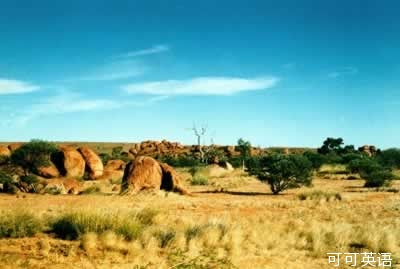(单词翻译:单击)
情景对话
Todd: Aaron, sometimes I hear from Australians, the term, have a walk-about, or walk-about!
托德:亚伦,有时我会听澳大利亚人说到“流浪”这件事!
Aaron: A walk-about is an aboriginal word. It basically, means an aboriginal boy, when he is growing up goes for a long walk, maybe for twelve months, and he doesn't see his family and he has to live off the land. He can't, he doesn't have money so he can't buy food, he can't buy anything, and he just hunts for food. It's not so common now, and I've never had to do it, but it's more of an old story from the aborigines who tell you about a walk-about.
亚伦:流浪是澳大利亚土著语。大意是说,一个土著男孩长大以后,会去远行,可能会用12个月的时间,这期间他不会和家人见面,而且要以土地为生。他不能,他没有钱,所以他不能刚买食物,他什么也买不了,他只能去打猎来获取食物。现在这种情况不是很常见,我从来没有做过这种事,这很像土著讲的老故事,他们会告诉你有关流浪的事情。
Todd: Do you know anybody who's ever done it?
托德:那你认识做过这件事的人吗?
Aaron: No, I've never know anybody to do it, but I don't know if it's a true story or, I don't think it's common now, but maybe in the old days, maybe a hundred years ago, it was common for them to do it, but now they don't.
亚伦:不,我认识的人都没有做过,不过我不太清楚这不是真实的故事,我认为现在并不常见,不过可能在过去,也许几百年以前,这种事很常见,不过现在没有人做了。
Todd: So, there's lots of different aboriginal people in Australia. Where does, which aboriginal tribe does this come from, or group?
托德:那,澳大利亚有许多种不同的土著。这个来自于哪个土著部落呢?
Aaron: OK, I'm not sure what tribe it comes from but the aboriginals in the Northern Territories, which is all desert are probably the most famous for it, near Darwin and the top end we way, the north of Australia, where it's very mountainous, and you could walk for a year, and never find your way anywhere.
亚伦:嗯,我不能确定这来自哪个部落,不过在全是沙漠的北部领土的土著人以“流浪”而闻名,那里位于达尔文市附近,澳大利亚最北端,那里属于山区,你可能走上一年,会找不到路的。

重点讲解
重点讲解:
1. live off
依赖……生活;
eg. I don't know how she manages to live off her painting.
我不知道她怎么能以画画为生。
eg. The whole population of the village live off tourism.
全村的人都以旅游业为生。
2. hear from
听说;从…听到;
eg. What are you hearing from people there?
你在那里都听到人们说了些什么?
When they did not hear from her, they feared the worst.
他们那时听不到她的消息,唯恐发生了最糟的事。
3. be famous for
因 ... 而闻名;
eg. Dunhuang is famous for its mural art.
敦煌以它的壁画艺术而闻名。
eg. He is famous for the excellence of his fine arts.
他以优秀的美术作品而闻名。


